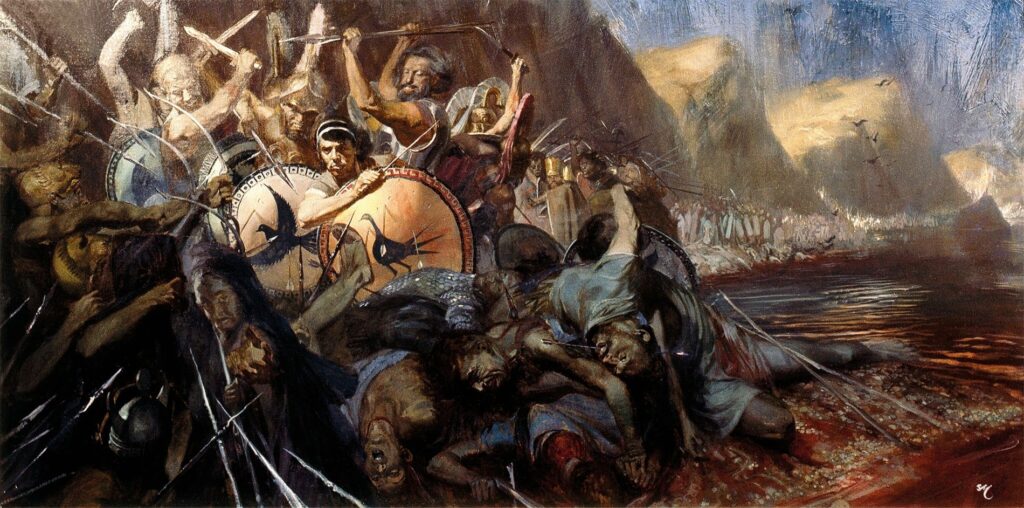Wednesday
Like much of the world, I’ve been thinking about those Ukrainians holed up in Mariupol, heroically resisting as Russia rains missiles down upon them. The Greeks resisting the Persian army at Thermopylae come to mind and, with them, A.E. Housman’s allusion to the battle.
Housman was a classicist as well as a poet, and details in “The Oracles” are drawn from Herodotus’s account of the famous battle. It took days of fighting before the large Persian army was able to overwhelm the smaller band. As Herodotus reports it, Xerxes imagined, somewhat like Putin, that the Greeks would simply retreat rather than stand and fight. After all, the numbers were all on his side. Here’s the famous Greek historian:
Hearing this Xerxes was not able to conjecture the truth about the matter, namely that they were preparing themselves to die and to deal death to the enemy so far as they might; but it seemed to him that they were acting in a manner merely ridiculous…
In Herodotus’s telling, an informant with inside information told Xerxes,
Hear then now also: these men have come to fight with us for the passage, and this is it that they are preparing to do; for they have a custom which is as follows: whenever they are about to put their lives in peril, they attend to the arrangement of their hair.
The Spartan king Leonidas, meanwhile, had been told an oracle that (again, according to Herodotus) either the Spartan capital of Lacedaemon would be “sacked by the children of Perseus” (the Persians) or he himself would die:
O ye men who dwell in the streets of broad Lacedaemon!
Either your glorious town shall be sacked by the children of Perseus,
Or, in exchange, must all through the whole Laconian country
Mourn for the loss of a king, descendant of great Heracles.
When, after four days of waiting, Xerxes did not witness the expected Greek retreat, he attacked. Even then it took numerous assaults, three days of fighting, and a Greek betrayal before he finally broke through.
In Housman’s poem, two oracles are mentioned: the Oracle of Dodona and the Oracle of Delphi (“the midland navel-stone beside the singing fountain”). That the oracles of old are now mute doesn’t bother the speaker. After all, he’s not important enough to warrant an oracle, and besides he has his own oracle–“the heart within”—that tells him he’s going to die. Therefore he tells the oracle priestess, whom he impudently calls “my lass,” to can it. Combining a stoic fatalism with a dash of bravado, he tells her,
Oh priestess, what you cry is clear, and sound good sense I think it;
But let the screaming echoes rest, and froth your mouth no more.
’Tis true there’s better booze than brine, but he that drowns must drink it;
And oh, my lass, the news is news that men have heard before.
In the face of overwhelming odds and expecting the worst, the Spartans calmly sat down and combed their hair. The speaker imagines himself doing something similar in the face of his own imminent death.
The Oracles
By. A.E. Housman
’Tis mute, the word they went to hear on high Dodona mountain
When winds were in the oakenshaws and all the cauldrons tolled,
And mute’s the midland navel-stone beside the singing fountain,
And echoes list to silence now where gods told lies of old.
I took my question to the shrine that has not ceased from speaking,
The heart within, that tells the truth and tells it twice as plain;
And from the cave of oracles I hear the priestess shrieking
That she and I should surely die and never live again.
Oh priestess, what you cry is clear, and sound good sense I think it;
But let the screaming echoes rest, and froth your mouth no more.
’Tis true there’s better booze than brine, but he that drowns must drink it;
And oh, my lass, the news is news that men have heard before.
The king with half the East at heel is marched from lands of morning;
Their fighters drink the rivers up, their shafts benight the air.
And he that stands must die for naught, and home there’s no returning.
The Spartans on the sea-wet rock sat down and combed their hair.
I doubt that the Mariupol defenders are combing their hair, but they appear to be no less stoic. And like Leonidas and his followers, they are setting themselves up to become legendary in their turn.
